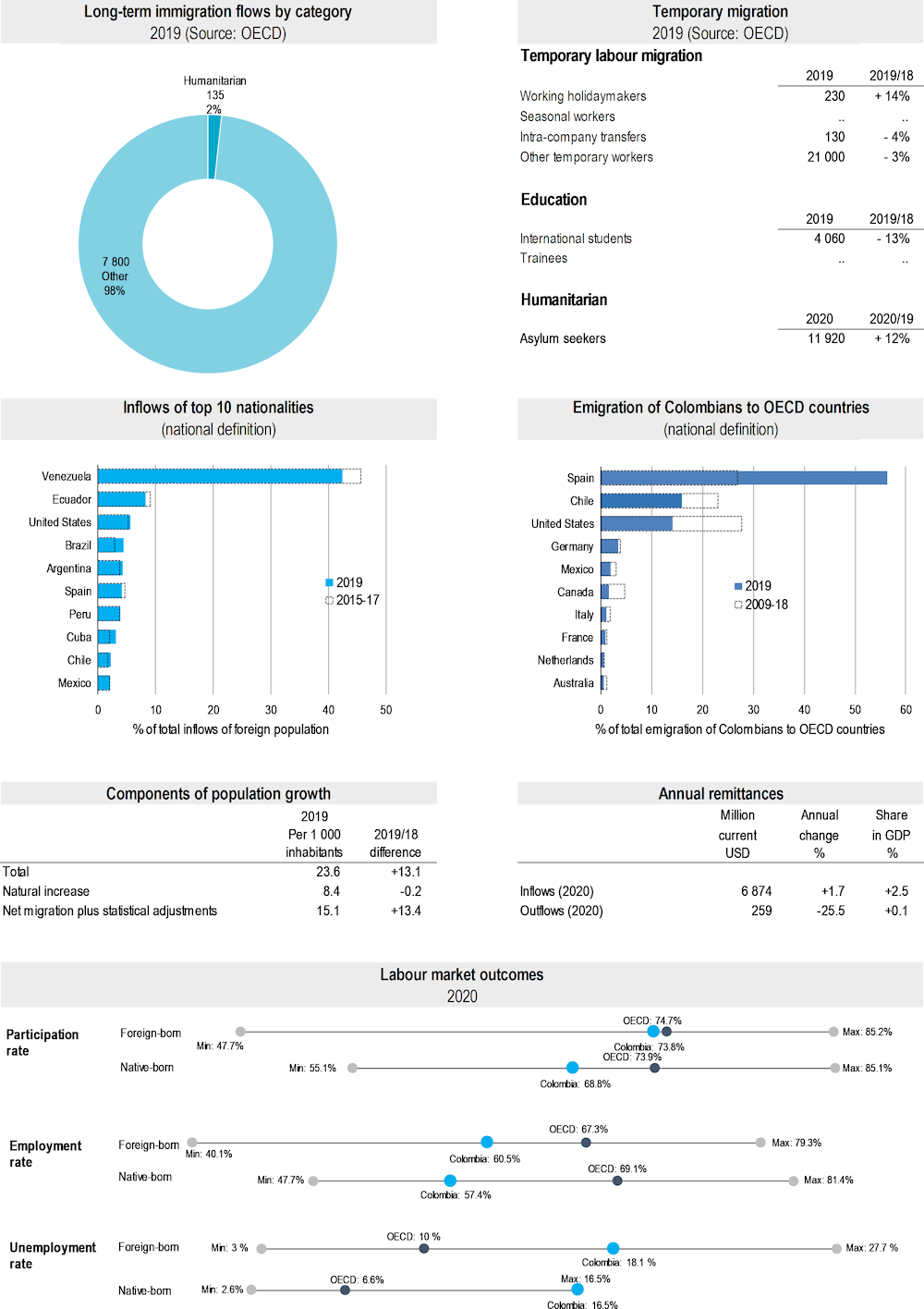Around 4 100 permits were issued to tertiary-level international students and 21 000 to temporary and seasonal labour migrants.
Venezuela, the United States and China were the top three nationalities of newcomers in 2019.
In 2020, the number of first asylum applicants increased by 12.2%, to reach around 12 000. The majority of applicants came from Venezuela (12 000), Cuba (57) and Ecuador (5). The largest increase since 2019 concerned nationals of Venezuela (1 400). Of the 1 100 decisions taken in 2020, 32.4% were positive.
Emigration of Colombians to OECD countries increased by 19% in 2019, to 135 000. Approximately 57% of this group migrated to Spain, 16% to Chile and 14% to the United States.
The pandemic has put a brake on migration to Colombia, which registered a decline of its immigrant population in 2020 for the first time since the crisis in neighbouring Venezuela initiated large‑scale migration. That notwithstanding, throughout 2020 and in early 2021, policy with respect to migration and integration in Colombia continued to be largely in reaction to the large inflows of Venezuelans. A key and recurring challenge has been to provide for appropriate regularisation procedures for those in an irregular situation. In recent years, Colombia initiated several rounds of renewal of the Special Stay Permit (Permiso Especial de Permanencia, PEP), which had an initial validity of two years. In addition, the government has also supported the prevention of statelessness by granting Colombian nationality to children born in Colombia to Venezuelan parents.
The Ministry of Labour, in co‑ordination with Migration Colombia, issued an additional phase of the PEP, called the Special Permit to Stay for the Promotion of Formalisation – PEPFF, which allowed the regularisation of migration through the formalisation of labour for Venezuelans in irregular migration status, guaranteeing their social security and decent work. The period of issuance of this was from February 2020 to 30 May 2021, achieving the regularisation of approximately 20 000 migrants.
Notwithstanding the above efforts by the Colombian Government, by the end of 2020, the majority of Venezuelans in Colombia were estimated to be in an irregular situation. To provide a lasting solution, the Colombian president announced in early February the creation of a new 10‑year temporary protection permit (TPS).
Venezuelan migrants resident in Colombia on 31 January 2021 will be available for the measure. In spite of the 31 January residency requirement, in an attempt to discourage illegal entry, migrants who arrive via legal channels over the next two years may also apply for the temporary protection permit. In total, more than 2 million Venezuelans are expected to benefit from the measure, making it one of the largest regularisations ever undertaken in the OECD.
Migración Colombia is in charge of implementing the measure, which is carried out in two stages. The first, which has been carried out virtually, consists of the registration of foreigners in the Single Registry of Venezuelan Migrants, a mechanism that will allow the National Government to characterise and identify the Venezuelan population living in Colombia, in order to be able to better target its policies. The second phase – in person – is the issuance of a Personal Protection Permit, a regularisation and identification document for Venezuelan citizens who benefit from the measure.
Colombia has also taken a number of measures to digitalise its migration services and foreigners visas. In terms of integration, the regular Joint Needs Assessment conducted by the Inter-Agency Group on Mixed Migratory Flows showed that the living conditions of refugees and migrants with the intention to stay in Colombia have deteriorated significantly following the introduction of the COVID‑19 preventive isolation measures.
For further information:

